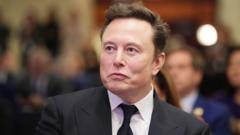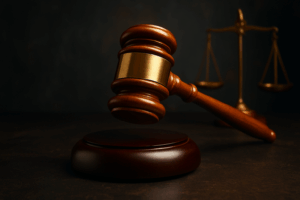Elon Musk has made headlines again by distributing $1 million cheques to Wisconsin voters in the lead-up to the state's contested Supreme Court election. This bold act follows a court ruling that allowed him to proceed, despite objections from the Wisconsin Attorney General who claimed it violated laws against vote-buying. The upcoming election is a significant event that could shift control of the court to the Republican side, heightening tensions amid critical political issues.
Elon Musk's $1M Cheque Giveaway Sparks Controversy Ahead of Wisconsin Supreme Court Election

Elon Musk's $1M Cheque Giveaway Sparks Controversy Ahead of Wisconsin Supreme Court Election
Billionaire Elon Musk faces legal challenges as he hands out $1 million cheques to Wisconsin voters before a crucial Supreme Court election.
Musk announced the cheque giveaway earlier in the week, targeting voters who supported his cause to halt “activist judges.” During a rally on Sunday, he distributed two cheques, prompting swift action from Attorney General Josh Kaul, who filed a lawsuit to prevent what he deemed an illegal attempt to sway voters. In response, Musk's legal team asserted that the attorney general was infringing on Musk's political speech rights under the First Amendment, insisting that the initiative aimed to foster grassroots movements rather than support specific candidates.
Initially supported by lower courts, Musk's actions were tested by an 11th-hour plea by Kaul to the state’s Supreme Court, which ultimately rejected the case. Musk, along with endorsements from former President Donald Trump, is backing Waukesha County Judge Brad Schimel, who is in a competitive race against Dane County Judge Susan Crawford, endorsed by the court's liberal justices.
Observers view this election not only as a battle for the court but also as a potential referendum on the current political climate in the country, especially in light of key upcoming cases involving abortion rights and voting regulations. With Musk contributing approximately $14 million to Schimel’s campaign, the election has already become the most expensive judicial contest in U.S. history with an aggregate of $81 million spent.
Despite Musk’s public backing, Schimel recently distanced himself from the controversy surrounding Musk's actions. This incident isn’t Musk’s first venture into political giveaways; he previously offered similar financial incentives in Wisconsin and other battleground states last year. However, a Pennsylvania ruling deemed that effort legal, finding no substantial evidence of unlawful lottery activities.
In a pivotal time ahead of the election, Musk's cheque giveaway continues to stir debate, encapsulating the intersection of big money, political influence, and legal frameworks in the American electoral landscape.
Initially supported by lower courts, Musk's actions were tested by an 11th-hour plea by Kaul to the state’s Supreme Court, which ultimately rejected the case. Musk, along with endorsements from former President Donald Trump, is backing Waukesha County Judge Brad Schimel, who is in a competitive race against Dane County Judge Susan Crawford, endorsed by the court's liberal justices.
Observers view this election not only as a battle for the court but also as a potential referendum on the current political climate in the country, especially in light of key upcoming cases involving abortion rights and voting regulations. With Musk contributing approximately $14 million to Schimel’s campaign, the election has already become the most expensive judicial contest in U.S. history with an aggregate of $81 million spent.
Despite Musk’s public backing, Schimel recently distanced himself from the controversy surrounding Musk's actions. This incident isn’t Musk’s first venture into political giveaways; he previously offered similar financial incentives in Wisconsin and other battleground states last year. However, a Pennsylvania ruling deemed that effort legal, finding no substantial evidence of unlawful lottery activities.
In a pivotal time ahead of the election, Musk's cheque giveaway continues to stir debate, encapsulating the intersection of big money, political influence, and legal frameworks in the American electoral landscape.





















